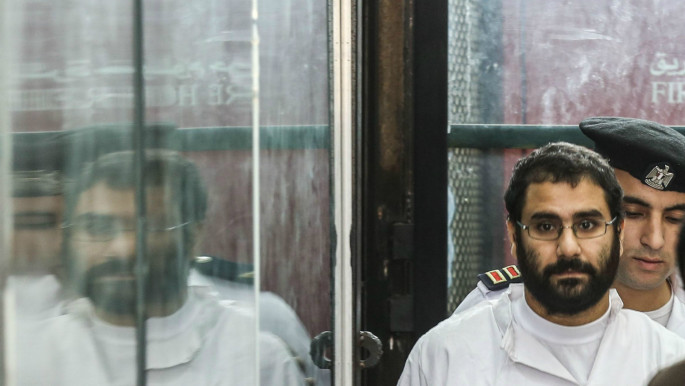
Essam Samir, one of Egypt's 41,000 invisible detainees
While many remember prominent Egyptian activist Alaa Abd al-Fattah, Esam Samir, a young farm worker, died in custody, one of the thousands of unknown prisoners in Egypt.
4 min read
Esam Samir is one of tens of thousands detainees [al-Araby al-Jadeed]
Essam Samir was a young farm worker from a village near Toukh in the province of Qalubiya, north of Cairo.
He was arrested last month whilst in possession of nitrate and urea which he had received from a local agricultural coop.
Although these are farming materials are commonly used as fertilizer, he was arrested on suspicion of possessing explosives last month.
He was already suffering from multiple health problems at the time of his arrest, including liver cirrhosis and heart problems. During his detention, he was tortured so severely that fellow inmates were practically carrying him during his trial.
Samir's story is virtually unknown. He was a young resident of an area which lies far from the spotlight of Cairo and Alexandria. He was not known to be active in politics or to belong to a political party. He does not have a Twitter account, followers or a fan base.
Samir died in custody and was buried on Wednesday afternoon.
According to the "medical negligence in prisons" campaign, 97 detainees died from January to September this year as a result of lack of access to medical facilities, including 24 who died as a result of torture.
Samir and Alaa
This week, many shared the story of Alaa Abdel al-Fattah, the prominent leftist blogger who has now been imprisoned for a year. Social media users changed their pictures to his face to remind people of his on-going detention.
Alaa was arrested during a demonstration outside the Shura Council for violating anti-protest laws.
While his younger sister, activist Sanaa Seif was pardoned, along with other prominent liberal activists during Eid this year, he continues to serve a five year term.
 |
|
| Alaa Abdel-el Fattah is a prominant activist and blogger serving a 5-year prison term [Getty] |
Accordingly, when news comes of a new arrest or disappearance, friends and family of the detainee trek from police station to police station, hire lawyers, follow-up on cases, report on them.
However, little is said about the vast majority of detainees in Egypt.
Although no individual prisoners' cases can never truly get enough attention – cases like Samir's are almost uncovered in the media.
A different class of oppression
It would be hard to deny that there is a strong class aspect to the amount of attention that Egyptian prisoners receive; Anglophone, politically active, middle class Cairenes are more prominent on our Twitter feeds than working class detainees from the country side, or cities' informal areas.
This is despite the fact that these demographics are most widely targeted by police, their informants and baltagia, or hired thugs.
As Amr Ali described, this was in fact the reality of the context to the murder of Khaled Saeed, the young Alexandrian who many felt sparked the flames of the 2011 revolution in Egypt.
Saaed's comparatively middle-class background was later emphasized, and he was portrayed as a human rights activist in a trend that possibly skewered the everyday issues that his story embodied; that of frustration, disempowerment, money problems, and drugs.
It was this frustration with local and everyday concerns that drove various differing segments of Egyptian society to express their frustration in the national, highly visible space of Tahrir Square.
Now the revolution has been put on hold, it is not only the revolutionaries – or even the Muslim Brotherhood – who are being targeted, but tens of thousands of ordinary Egyptians.
Their stories must be told, not only to help save their lives, but also to articulate the problems of Egypt that go beyond abuses at Tahrir or of human rights activists; they go beyond the persecution of the Muslim Brotherhood and even the horrific massacre of Rabaa.
Their stories must be told to demonstrate the oppression of the majority of ordinary Egyptians, the vast majority of whom never went to Tahrir, and have never been politically active.
And if this is was adequately articulated, possibly the Egyptian population would be more empathetic to an opposition to the rule of Sisi; to an oppression that speaks of their struggle.
As Alaa fought to achieve bread, freedom and social justice, surely he would want us to use to his case to shed a light on cases such as Samir's; on Egypt's 41,000 other invisible political detainees.





 Follow the Middle East's top stories in English at The New Arab on Google News
Follow the Middle East's top stories in English at The New Arab on Google News


